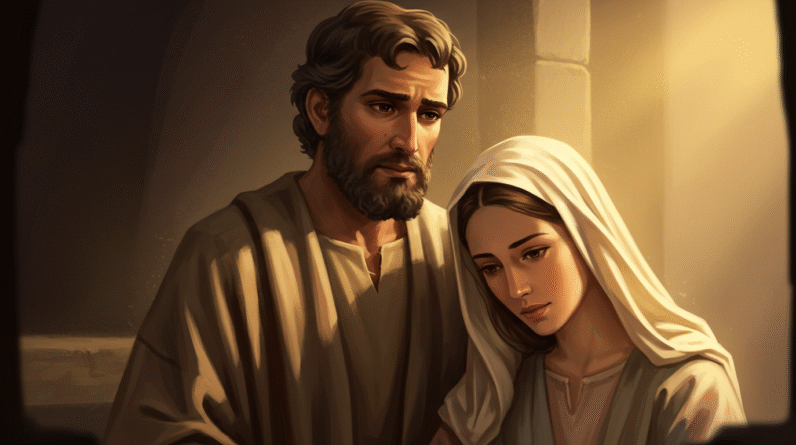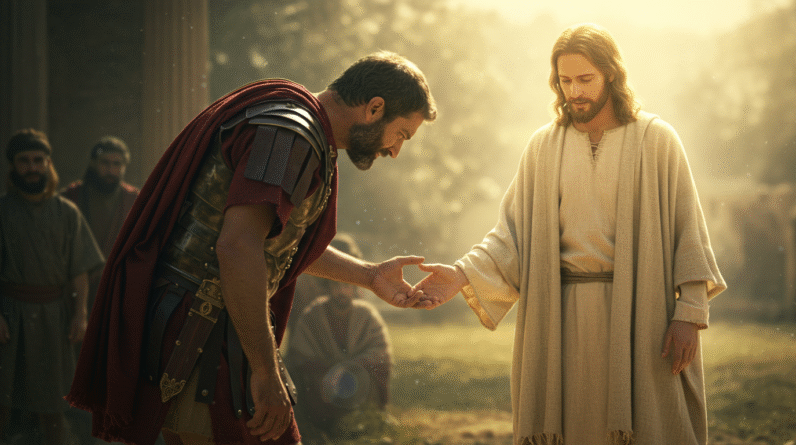Explore the redemption of Peter and King David. Delving into human failure and divine restoration, this article offers insights and hope from biblical narratives.

Characters Who Failed But Were Restored – John 21:15-19; 2 Samuel 11:1-27
Failures and restorations are themes deeply embedded in human experiences. The Bible, with its rich tapestry of stories, brings these concepts to life, showcasing characters who faltered but found their way back to grace. Today, we delve into the stories of Peter and King David—characters whose failures were significant but who were ultimately restored, finding redemption and renewed purpose.
Peter: The Rock Who Momentarily Crumbled
Key Reference(s): John 21:15-19
Peter, one of Jesus’ closest disciples, was a fisherman by trade before becoming the “rock” on which Jesus would build His church. His passionate and impulsive nature marked his every action, from walking on water to denying Christ three times. Despite his human flaws, Peter’s redemption and reinstatement underscore the boundless mercy of Jesus Christ, offering hope and renewal to all who falter.
Peter’s Story in the Bible
Peter’s story unfolds with his humble beginnings as Simon, a fisherman. Called by Jesus to follow Him and become a “fisher of men,” Peter witnessed miracles and wisdom that would profoundly change him. Yet, the night before Jesus was crucified, Peter faced his greatest failure. Three times he denied knowing Jesus, caving under the pressure of fear and self-preservation (Matthew 26:69-75). This moment, foreseen and foretold by Jesus, underscored Peter’s humanity—his fallibility in dire circumstances.
But Peter’s tale doesn’t end in defeat. After the resurrection, Jesus reinstates Peter in a poignant moment of restoration by the sea. In John 21:15-19, Jesus asks Peter three times if he loves Him, mirroring Peter’s triple denial. Each affirmation from Peter is met with an exhortation to “feed my sheep,” symbolizing Peter’s restored role as a leader in the early church. This renewal not only highlights Jesus’ forgiveness but also Peter’s resilience and dedication to his faith journey.
Lessons from Peter’s Life
Peter’s life is a mirror reflecting the struggles and triumphs of ordinary believers:
- Acknowledging Weakness: Peter’s denial demonstrates that even the most devoted followers can falter. It’s crucial to acknowledge our weaknesses and seek strength from God.
- Restoration Through Christ: Peter’s reinstatement is a powerful reminder that with genuine repentance, restoration through Christ is achievable for anyone.
- Love’s Redemption: The conversation by the sea highlights love’s power to heal and restore, underscoring that love for Christ fuels our mission and purpose.
Connection to Today’s World
Peter’s story resonates profoundly in our modern world. In an era of social pressures and rapid changes, the fear of judgment or failure often leads us to act against our values and beliefs. Peter reminds us that missteps need not define us. Instead, we can turn to forgiveness and renewal, finding our footing in a world that often sets us adrift.
Key Bible Verse
“Simon son of John, do you love me?” – John 21:16
This verse captures the essence of restoration. Jesus’ question is not merely about allegiance but reaches into the depths of heart transformation. It reflects the personal call to love deeply and live with commitment.
Thought-Provoking Question
When faced with temptations or challenges, do you anchor your identity in your love for Christ, as Peter eventually did?
David: The King with a Contrite Heart
Key Reference(s): 2 Samuel 11:1-27
King David, known for his unparalleled leadership and devotion to God, was not immune to grave failures. His life is a dichotomy of triumphs and transgressions, portraying a man beloved by God yet deeply flawed. The narrative of David’s sin with Bathsheba and the subsequent events is a sobering reminder of earthly temptations offset by divine forgiveness and grace.
David’s Story in the Bible
David’s story in 2 Samuel begins with a path many have trodden—a path of desire leading to sin. While his soldiers were at war, David lingered in Jerusalem, where he desired Bathsheba, the wife of Uriah (2 Samuel 11:1-27). This desire snowballed into adultery and murder as David sought to cover his wrongdoing. The ripple effects of this sin were profound, resulting in personal and national turmoil.
Yet, when confronted by the prophet Nathan, David’s response illuminated his character. Broken and repentant, David penned Psalm 51, an earnest plea for cleansing and a heart renewed in God’s steadfast love. Unlike many kings before and after him, David didn’t cling to pride. Instead, he accepted responsibility and sought God’s mercy.
Lessons from David’s Life
David’s narrative shines with lessons as applicable today as they were millennia ago:
- The Consequences of Sin: David’s story highlights how sin, no matter how hidden, brings far-reaching consequences. Awareness of these consequences can guide our choices.
- The Power of Repentance: David’s genuine repentance and contrition exemplify turning back to God wholeheartedly, an essential aspect of spiritual growth and healing.
- Leadership and Accountability: David remains an example of a leader who, despite failure, took accountability for his actions, showing that true leadership involves owning one’s mistakes.
Connection to Today’s World
In today’s world of instant gratification and moral ambiguity, David’s story is profoundly relevant. It speaks to everyone, urging us to take stock of our lives and recognize when we stray. Moreover, it highlights the beauty of humility and the courage it takes to address our missteps openly, showcasing repentance not as a weakness, but as a path to restoration.
Key Bible Verse
“Create in me a pure heart, O God, and renew a steadfast spirit within me.” – Psalm 51:10
This verse stands as a beacon for all seeking forgiveness. David’s plea serves as a reminder that even the gravest errors, when met with sincere repentance, can lead to a reborn spirit and steadfast devotion.
Thought-Provoking Question
How do you approach God when you’ve faltered, seeking restoration with humility as David did?
Reflections on Restoration and Faith
In compiling the heartwarming stories of Peter and David, we are struck by the kindness woven throughout their paths. Their narratives extend far beyond their failures, diving deep into the realms of repentance, forgiveness, and triumph over adversity. They teach us that our identities are not cemented in our transgressions but can be beautifully reshaped by grace. As you reflect upon their stories, consider how their lives parallel yours. Whether it’s a professional setback or a personal failing, allow their experiences to enrich your understanding of restoration’s transformative power.
Conclusion
These biblical narratives remind us that life’s challenges will invariably test our character. Yet, through introspection, prayer, and unwavering faith, restoration is possible. Embrace the journeys of Peter and David as guides, knowing that each step, even those misdirected, can refine and redefine your spiritual walk.







